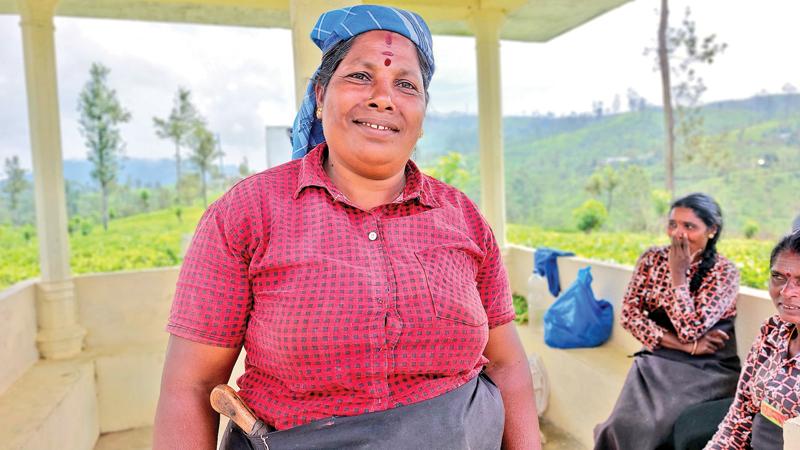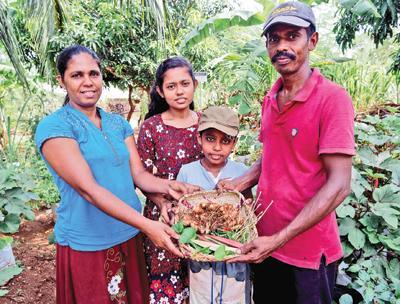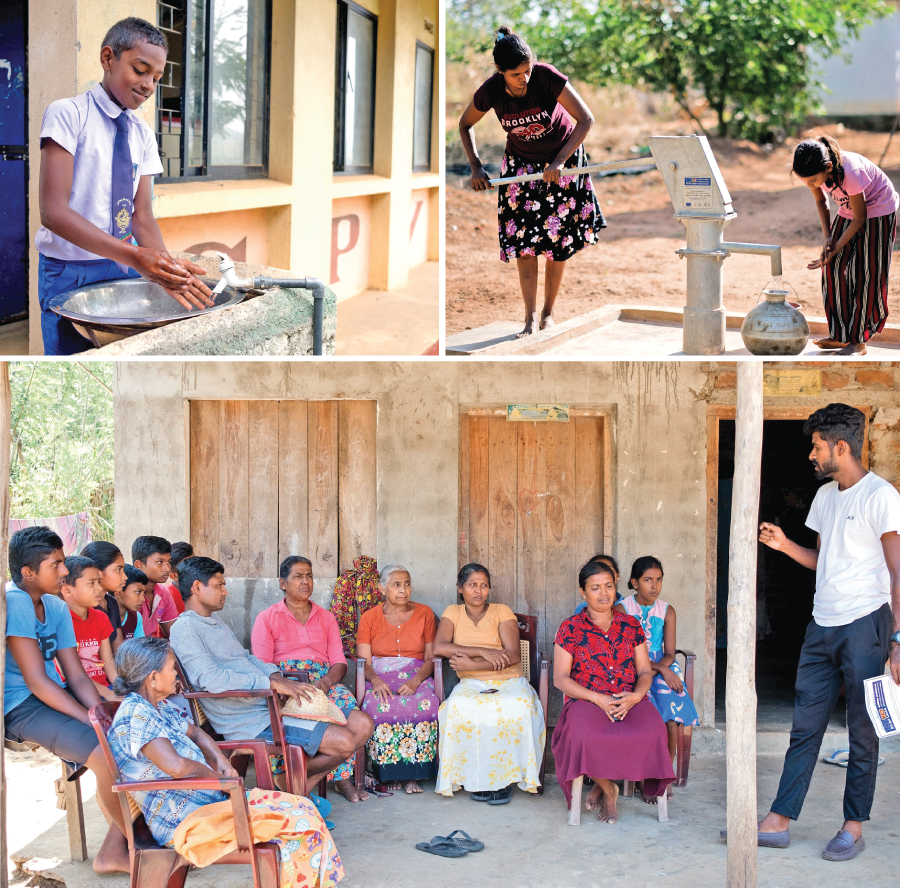
During most months of the year, Lediyangala, a village in Wilgamuwa, Matale remains dry and sunbaked. But in stark contrast to its arid surroundings 35-year-old Geethani Kusumalatha’s home garden is green, lush, and thriving. Three years ago Geethani started home gardening under the guidance of agricultural trainers from the ‘Assisting Communities in Creating Environmental and Nutritional Development’ or ACCEND project.
According to Geethani, being chosen as a beneficiary of the project several years ago has now come as a great relief to her as Sri Lanka has been hit with a severe economic crisis.
With her husband now finding it hard to come by any work, Geethani says her home garden has become a lifeline for her family. “Given the economic situation, it would have been difficult for us to purchase vegetables and other food items from the shops. But because of the home garden, we have been able to limit these purchases,” she said.
A walk through her garden reveals an array of produce including vegetables, greens, grains and even spices. Geethani also makes her own organic fertiliser and even harvests seeds for recultivation as directed by the project’s trainers.
The mother of two young children says she has also noticed an improvement in their nutritional status. Geethani now also helps others in the community to start their own home gardens. “They are keen and interested after seeing the support it has given us. I share what I have learnt,” she said.
EU funds
The ACCEND project which commenced in 2017 has supported many others such as Geethani from vulnerable communities in the Matale, Moneragala, and Nuwara Eliya districts. The project was implemented in Sri Lanka by the Adventist Development and Relief Agency (ADRA) and Oxfam. However, the project would not have become a reality for its beneficiaries without the support and generous funding offered by the European Union.
The setting up of home gardens is merely one aspect of the wide-ranging project that has focused on improving water, sanitation, hygiene, health, and nutrition in these underprivileged communities.
 The project has set up 1,574 Nutrition Home Gardens and provided 408 latrines, 20 Improved Gravity-Fed Water systems, 98 hand pumps, and 10 solar-powered water projects while renovating another 253 hand pumps in the Matale and Moneragala districts. To ensure the continuous maintenance of the facilities provided, the project has set up Community-Based Organisations and trained volunteers from the community for the purpose. As such, the project has been able to provide over 300,000 people with access to safe drinking water.
The project has set up 1,574 Nutrition Home Gardens and provided 408 latrines, 20 Improved Gravity-Fed Water systems, 98 hand pumps, and 10 solar-powered water projects while renovating another 253 hand pumps in the Matale and Moneragala districts. To ensure the continuous maintenance of the facilities provided, the project has set up Community-Based Organisations and trained volunteers from the community for the purpose. As such, the project has been able to provide over 300,000 people with access to safe drinking water.
The project with the aim to provide much-needed support to education and health facilities in these communities has not only renovated 15 schools, 13 estate-based child development centres, and 30 polyclinics or government medical health centres across these three underdeveloped districts but also provided them with additional facilities required.
Major sanitation issue
Before the ACCEND project set up a sanitary napkin disposal unit and a toilet designated for female students alone, many girls studying at the Naminioya Maha Vidyalaya in Matale would miss school during their menstrual cycle. According to the school’s senior section head, S.B Geetha Kumari, safe and secure disposal of sanitary napkins was once a major sanitation issue at the co-educational school in the Matale district.
“There are 740 female students in the school. They felt uncomfortable coming to school during their period. Being forced to miss school affected them psychologically. After the setting up of the disposal unit, there is a noticeable decrease of students missing school,” she said
Meanwhile, schools such as the Mahawatenna Primary School in Perakanatte, Matale which lacked many facilities also benefited from the project. The school where a majority of the students are economically disadvantaged was renovated and provided with a new toilet, educational equipment, teaching aids and television to improve the education of their students.
While similar facilities were provided in both the Matale and Moneragala districts, in the Nuwara Eliya district, the ACCEND project was met with several unique issues faced by residents in the area. Among them was the lack of job site restrooms for tea estate workers. In response, the project constructed 20 restrooms for estate workers in the Horana, Maskeliya and Bogawantalawa Plantation areas.
End to worries
Prior to the construction of the restroom in their estate, 52-year-old M. Thevani, a tea plucker from the Brunswick estate along with her workmates would just sit out in the open during their tea break. “If it rains we have to abandon it. Now we rest without any worries,” she said.
According to Thevani, the lack of a washroom near the tea fields meant many had to return home for the purpose, with some having to walk nearly two kilometres to relieve themselves. According to her, the job site restrooms have made their lives easier.
The Bloomfield estate in the same area has been provided with three enclosed community bathing places by the ACCEND project with the support of the residents and the estate management giving the 52 families in the area a safe and enclosed space for their bathing purposes. The bathing place in Bloomfield is just one out of the 34 bathing places constructed in estate communities.
According to Ramasamy, a CBO leader in the area, earlier residents were forced to bathe out in the open from one pipe set up among the rocks. Not only would they have to wait for their turn, but bathers would also at times come across snakes and other wild animals while passers-by in vehicles would leer at the female bathers. He says the women now feel safe and more secure.
ACCEND has also provided a much-needed water supply to the estate communities by setting up 20 improved gravity-fed water systems. Water from natural water sources is collected into tanks at higher elevations, filtered and supplied to estate communities in the area. E. Sathyaseelan, a resident of Norwood Upper division says now the community consisting of 337 families has water throughout the day.
“Earlier we shared a water pipeline with other communities in the area. But it was unfiltered and we only had water during certain times of the day. There was a shortage of water even when it rained,” he said. He believes a close friend had contracted chronic kidney disease as a result of consuming unfiltered water. “We can drink this water without any fear now,” he added.
Community Based Organisation
The Community Based Organisation (CBO) under ACCEND in Sathyaseelan’s village collects Rs. 100 per month from the families. The beneficiaries intend to use the funds to maintain the water project and also use it for other community development projects.
In addition to this, ACCEND has also set up automated early warning systems on rainfall with SMS alert services and restructured drainage systems in tea estate communities while also constructing latrines and bathing facilities.
But the ACCEND project has not stopped short of merely providing the communities with vital infrastructure. Going a step further, the project also carried out numerous workshops and awareness programs for both children and adults in the three districts on a range of topics including ICT, nutrition and sanitation.
Among them, were the Child Hygiene and Sanitation Training (CHAST) and the Participatory Hygiene and Sanitation Training (PHAST) approved by the World Health Organization. This training provided children and adults with information on safe hygiene and sanitation practices.
According to a participant of the training, H.M Samanthi Kumari from Bogahawewa, Matale undergoing the training helped the community to keep safe, especially during the Covid-19 pandemic. She credits the training to the reduced spread of Covid-19 in the area.
The benefits to the people of the Matale, Moneragala and the Nuwara Eliya districts through the ACCEND project since 2017 are immeasurable. ACCEND has provided vulnerable communities with long-needed basic facilities and taught people self-sufficiency while bringing all members of the communities together for their own development. In the past five years, the project has provided invaluable support to these communities and uplift the lives of over 830,000 people in Sri Lanka.

